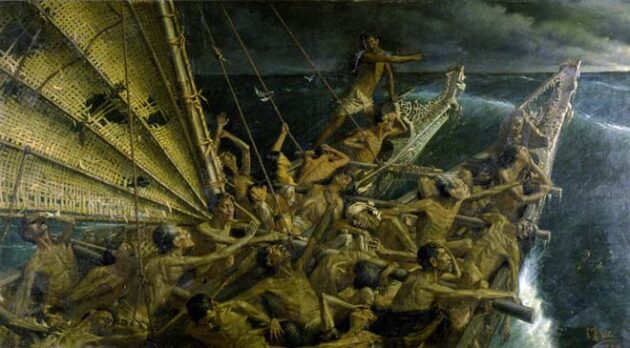If you don’t have a Silver level membership yet you are missing out on our Insight Politics articles and politicasts.
Today is a FREE taste of an Insight Politics article by writer Chris Trotter.

Labour Adrift In Dangerous Waters
THERE IS SOMETHING seriously amiss in Labour’s caucus. Too few, if any, Pakeha Labour MPs are willing to oppose the plans of their Maori colleagues. Though Nanaia Mahuta’s “Three Waters” proposal now offers the National Party a plausible pathway to power in 2023, her Pakeha colleagues will not call “Taihoa!” In the ideological hothouse of the contemporary Left, the slightest challenge to an indigenous agenda is taken as proof of unreconstructed “White privilege”. As such it spells certain career death. So, silence reigns – even as danger approaches.
That Mahuta is determined to force through her reforms is made very clear in her media release of Friday, 1 October 2021:
“The challenges facing our water system and services have been around for more than two decades and we need to address them now. We are taking feedback on board, while reaffirming the status quo will not continue.”
It is very difficult to interpret this statement as anything other than a promise that the proposed reforms will proceed with – or without – the support of a majority of New Zealand’s local authorities.
Even if the Three Waters proposal were about nothing more than the upgrading of New Zealand’s drinking, storm and waste water services, the Minister’s blunt warning that “the status quo will not continue” would be extraordinary. The entities being addressed are, without exception, the democratically-elected local and regional governments of New Zealand. To even imply that their objections will simply be bulldozed aside by central government is outrageous.
But, of course, the Three Waters proposal is about a great deal more than upgrading and future-proofing. If it proceeds according to Mahuta’s design, then iwi authorities will become the beneficiaries of what to most observers will look like water royalties in perpetuity. The Waitangi Tribunal found that, via te Tiriti o Waitangi, Maori retain a direct interest in the nation’s water resources. Mahuta seems absolutely determined to acknowledge that interest legislatively.
Not that she is all that willing to admit, unequivocally and in public, that this is her plan. Instead, she maintains the fiction that the four proposed “entities”, in which she proposes to entrust the management of New Zealand’s drinking, storm and waste water services, will be “owned” by the nation’s local authorities. But, this is, quite simply, untrue. The governance structures envisaged by Mahuta will have only the most tenuous relationship with the voters who elect local authorities. The ultimate decision-makers (half of whom will be Maori) will be in no way answerable to the multiple local electorates in which “ownership” ultimately resides, for the very simple reason that none of them will be directly elected.
These are not the sort of details Mahuta is keen to see debated in public – she much prefers to shroud them with the drop-cloths of vague bureaucratese. “Refinements” to her plans will be considered, but only “within the Government’s bottom lines of good governance, partnership with mana whenua, public ownership and operational and financial autonomy.”
Translation: Direct democracy will be ruled out completely. Iwi will exercise veto power over all important policy decisions. The four regional entities will operate with the full protection of the centralised state. Our new water-lords will be insulated from any attempt to hold them politically and/or fiscally accountable for their actions.
When the full extent of Mahuta’s ambitions became known to her colleagues – and most particularly her Cabinet colleagues – there should have been a robust and decisive intervention.
That the nation’s drinking, storm and waste water services are in dire need of expensive attention is accepted by just about everybody. (Even if by no means all of them are equally in need.) But what Mahuta is proposing is a disturbingly radical solution to another problem altogether – i.e. Who owns the water? That she has been less-than-forthcoming about her true intentions can hardly be presented as a government acting in good faith, and politicians of the old school would have recognised immediately the potential for the Opposition to make trouble – big trouble.
But, just as with the He Puapua Report, no politicians of the old school were there to cry “Taihoa!” Among the new breed there is evidently little appetite for debating the obvious political consequences of Maori separatist policies. Whether that is because they endorse the frankly revolutionary agenda of their Maori colleagues; because they are confident their woke allies in the news media will collude with them by keeping the public in ignorance of said agenda; or both: Labour’s leaders seem inordinately relaxed about drying their gunpowder before the fire.
Still, political blunders are there to be taken advantage of, and National is well-placed to take advantage of the Three Waters imbroglio. Not least because the Opposition MP given the job of marking Mahuta is Christopher Luxon.
As events are currently unfolding – especially on the Covid front – Luxon is likely to emerge leading the Opposition’s charge against Three Waters at about the same time as the campaign launched by his patron and mentor, John Key, is reaching its crescendo.
Clear across the right of the political spectrum, anger and impatience is growing with the Labour Government’s all-too-evident Covid incapacity. Key’s op-ed piece on re-opening New Zealand to the world shows every sign of having shaken loose the rocks below the scree. Pretty soon Jacinda Ardern and her colleagues are going to find themselves assailed on all sides by the mutinous conscripts of her weary Covid army.
With the voters’ allegiances in flux and the Labour government faltering, Luxon leading the charge against Three Waters will present the disgruntled and demoralised with precisely the “man on a white horse” they are looking for. As a champion of both national unity and liberal democracy, Luxon will find himself lauded as the obvious replacement for Judith Collins. Indeed, if he manages to stay on his white horse, the respondents to the pollsters’ “Preferred Prime Minister” question will leave National’s caucus with no other acceptable course of action.
And the fate of Mahuta’s Maori Caucus: the source of all Labour’s woes? Well, Winston Peters made a clean sweep of the Maori seats once before – why not again? Luxon will need someone on his left to balance off David Seymour on his right. A win-win-win strategy all ‘round.
And God gets to keep His three waters.
If you enjoyed that FREE taste why not subscribe to a SILVER level membership today?
You will not only get access to Insight Politics articles like the one above and Cam’s politicasts but you will also gain access to all our puzzles, SonovaMin and BoomSlang’s fantastic cartoons, HangonaMin’s Satirical Woke Examiner and our private members’ forum MyBFD as well as enjoying ad-free viewing.
$25 a month ($6.25 a week) (89c a day)
$300 a year

